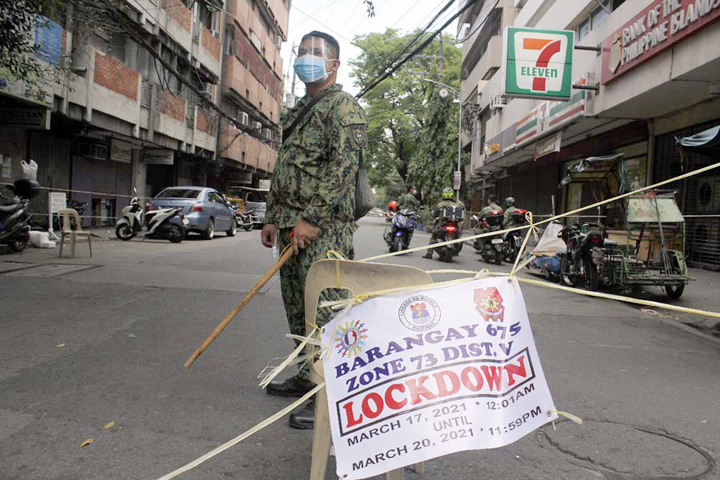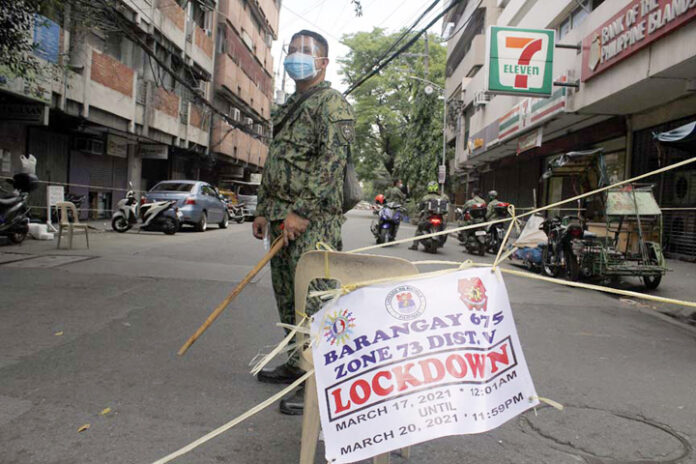
The government tightened the quarantine restrictions of the “travel bubble” in the National Capital Region (NCR) and its surrounding provinces, enforcing a full scale lockdown starting Monday as Covid-19 cases breached the 9,000 mark today.
In an online press briefing, Presidential spokesperson Harry Roque said President Rodrigo R. Duterte approved the recommendation of the Inter-Agency Task Force for the Management of Emerging Infectious Diseases (IATF) to reimpose enhanced community quarantine (ECQ) in the said areas to slowdown the surge of infections.
He said the declaration will also give the government time to open more quarantine and isolation facilities and allow medical workers to rest.
“Because of the new variants, the number of cases shoot up so some hospitals especially in Metro Manila are now under critical [utilization] capacity,” Roque said.
To recall, the government also placed the entire country under ECQ on March 2020 during the onset of the Covid-19 crisis.
Roque said the government hopes to contain the latest surge in Covid-19 cases once it becomes more aware of the nature of the more infectious variants now spreading in the country.
The ECQ will cover NCR plus, which covers Metro Manila, Bulacan, Rizal, Cavite, and Laguna, will take effect form March 29 to April 4, 2021.
Meanwhile, other areas around NCR plus including Central Luzon, Cordillera Administrative Region (CAR), CALABARZON (Batangas and Quezon only) are required to impose stricter minimum health standards.
Holy week break
Roque said the government intentionally scheduled the ECQ during the Holy Week break to minimize its economic impact since most businesses do not operate during the holiday.
During ECQ, most business establishments would be closed, except those in crucial industries, which would operate on 50-percent capacity.
Only “Essential” workers are allowed to go out. They include those employed in the media, medical-related facilities, drug stores, veterinary clinics, financial establishments such as banks, telecommunication companies, manufacturing, funeral home and embalming services, security, real estate, capital markets, water and sanitation, energy, airlines, business process outsourcing, humanitarian assistance, religious ministers, as well as repair and maintenance.
While public transportation will still operate, it will be on a limited scale, thus Roque said, employers may have to provide shuttles to transport their employees.
The Department of Transportation (DOTr) will release the guidelines for restricted public transportation on Monday.
Roque said the government will provide financial assistance to displaced workers.
He said the government is determining where to source the funds, the amount and mode of distribution.
APOR exemption
A stricter curfew will also be in effect in ECQ areas, which will last from 6 p.m. to 5 a.m..
Roque said Authorized Persons Outside of Residence (APOR), such as workers, and those buying food and medicine, will be exempted from the curfew.
Those who will leave their homes during the ECQ, while not required to carry a quarantine pass, must be able to prove they are APOR in police check points in NCR plus.
People aged below 18-years over 65 years old will be generally not be allowed to leave their homes unless they are APOR.
Mass gatherings, including religious activities, are also temporarily banned in NCR Plus for the duration of the ECQ.
Roque urged the public against “panic buying” since supermarkets, wet markets, convenience stores, pharmacies, hardware and other essential store and even food delivers will remain operational during the ECQ.
The Department of Agriculture (DA) and the Department of Trade and Industry (DTI) also assured there will be sufficient supplies of basic commodities in ECQ areas.
Simultaneous vaccination
Aside from the ECQ, Roque said the IATF also expanded the list of priority sectors for the government vaccination program.
The expanded list will now also cover those involved in Covid-19 case management, senior citizens, and those with controlled comorbidities. They will be included in the “quick substitution list” for vaccination.
Prior to the said policy, Covid-19 vaccines where used primarily for medical workers only.
Roque said the simultaneous vaccination of medical workers with the additional priority sectors is expected to start on Sunday.
Image credits: Roy Domingo
Read full article on BusinessMirror



